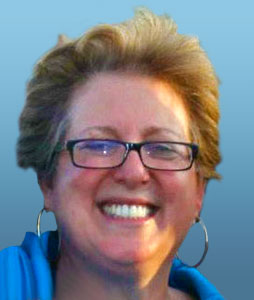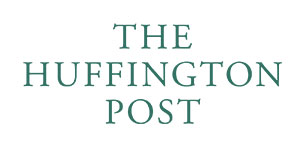
![]()
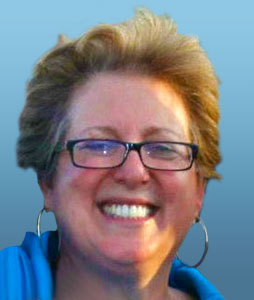 Caryl M. Stern, President and Chief Executive Officer of the U.S. Fund for UNICEF, received her Bachelor’s degree from SUNY Oneonta in 1978. She went on to receive her master’s degree at Western Illinois University and doctorate in education at Loyola University Chicago.
Caryl M. Stern, President and Chief Executive Officer of the U.S. Fund for UNICEF, received her Bachelor’s degree from SUNY Oneonta in 1978. She went on to receive her master’s degree at Western Illinois University and doctorate in education at Loyola University Chicago.
She joined the U.S. Fund for UNICEF in 2006 as COO and assumed her current position as President and CEO in 2007. Before this, she served as the COO and Senior Associate National Director of the Anti-Defamation League (ADL) and Dean of Students at Polytechnic University in New York.
She is the author of I Believe in Zero: Learning From The World’s Children (to be released in Fall 2013), and co-author of Hate-Hurts: How Children Learn and Unlearn Prejudice (2000) and Future Perfect: A model for Professional Development (1987).
She is the recipient of many awards, including most recently the 2012 Leading Lights Award from the National Multicultural Institute and FutureWork Institute. In 2009, Stern was named “Outstanding Alumna” by her alma-mater and received the Outstanding Commitment to Diversity and Inclusion Alumna Award.
Stern is a prime example of the strength of the vibrant community within the Power of SUNY.
![]()
1. In 2009, you were named “Outstanding Alumna” by your alma-mater SUNY Oneonta and received the Outstanding Commitment to Diversity and Inclusion Alumna Award. What did this award mean to you and how does it reflect your work at the U.S. Fund for UNICEF?
It meant a lot to receive the award because my years at SUNY Oneonta were phenomenal. It was a great place to be and I think that I found out who I was while I was there. I gained a lot of confidence and learned how to public speak. My degree helped me broaden my horizon in terms of having a vested interest in diversity and political activities. So, to get all that and then get honored by them is really nice. It’s like when your family acknowledges your work. It was really exciting.
2. What are you able to achieve as the President and Chief Executive Officer of the U.S. Fund for UNICEF?
I have the greatest job in the world. I get the privilege to advocate on behalf of the world’s children, to help the raise money and the moral and political support necessary to ensure their lives. I feel like what I do makes a difference and I get to use the power of my voice and my pen on their behalf. I get to visit places I have only ever dreamed of seeing and I get to be on the grounds and actually be useful. I have a phenomenal team who works with me and so I come to work genuinely excited by what I’m doing. It’s the greatest job in the world.
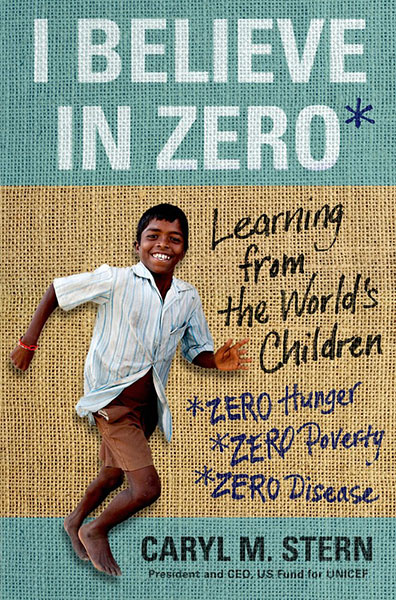
3. Your new book, I Believe in Zero: Learning From the World’s Children will be released Oct. 1. It is a collection of first-hand stories of children and families that you have met from your travels. What parts of this book are you most excited to share with the world?
The book consists of stories from the various places I’ve gone and how they’ve changed me as well as how I see the world. It talks about the things that have really surprised me: the sense of community in some of the poorest places in the world, the wisdom of children, the sheer honesty of children and the privilege of working with them. It’s also about being 50 years old when I took the job and now I’m 56 and what it feels like to sleep in a tent for the first time since I was a Girl Scout, or be scared because there are rebels, bugs or snakes and feel very empowered by getting through all that. It’s also about the world I envisioned for my own children and realizing that every mom wants that for their children. I’m hopeful that it will give voice to children that the rest of the world doesn’t hear.
4. You’ve said that you were drawn to UNICEF because of your commitment to children, education and equity. In what ways have you seen progress since you have taken on this mission and where do you still see the most need for support?
I’ve seen progress in all three and the need for more support in all three. In the 1980s, over 30,000 children were dying every single day of causes we already knew how to prevent but just weren’t. That is an unbelievable number. Consider the population of SUNY Oneonta. At the time I was there, the campus was about 6,000. Think about five times that many people dying every day due to causes we could prevent.
Today that number stands at 19,000 so we’ve almost halved that number. In the same time, the world population has nearly tripled so in theory, if the equation stays the same, then 90,000 children would be dying every day and yet it’s down to 19,000. So really it’s a huge success story and on one hand that’s great and on the other hand, 19,000 children are going to die today before I go to sleep of causes that I could prevent and I’m not. Those are the things that keep me up at night.
On the equity agenda, when I was a kid I still remember when neighborhoods were segregated, you didn’t date someone that didn’t look like you, job equity wasn’t there, and I could not envision an African-American president. So I’ve seen huge progress. My children’s friends reflect the rainbow and they don’t give it a second thought.
At the same time, I know that there are still true inequities in my own country, schools are not equal, neighborhoods are not equal and access is not equal. We are much further along but we’re not there yet. Put it into a developing nation and it becomes 10-fold. So again, it’s the best success story and it’s the area we still need a lot of work in.
5. You work with children all over the world in the most desperate of situations. What is your message to SUNY students and how would you encourage them to get involved as global citizens?
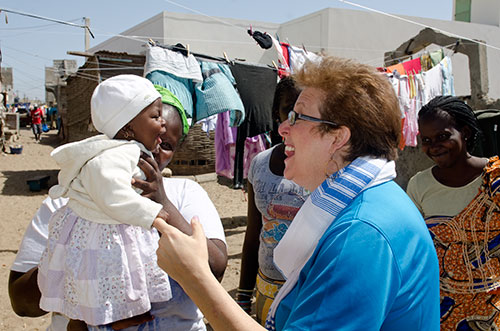
My message is tri-fold. The first is that it’s time for the world to stop defining children by the borders they are born between but instead define them by their age. Children are children. They are not Pakistani children, Syrian children, or African children. They are children. And we are grown-ups and we are our brother’s keeper.
The second message is that when I went to SUNY Oneonta I never realized what a big difference one person can make. Having this job gets me the opportunity to see not only what I can do but to see the difference that others make. Sometimes the difference is being the person who actually goes and does the aid or raises the money to make the aid possible or writes the article that changes the opinion. Sometimes it’s the person who holds the hand of the mom that just lost a child, or the person who cares enough to do the homework to figure out where to send the one dollar. It’s the person who sends me the note saying my family no longer can eat but I’m still sending ten dollars to give to the world children.
It is recognizing the power of giving and that it is not measured by how financially well off you are, but by the wealth of your heart – and that is something we all have potential to grow.
My third message is that you can get involved any way you want to. You can log onto our website, www.unicefusa.org, and you can find a myriad of ways you can volunteer for us and you can do the same for a host of other organizations. You can make the commitment and each day give one minute of your time and your life will be so much richer.
6. Before your career in carrying out humanitarian efforts through international non-profits, you also had a career in higher education, including the first female dean hired at Polytechnic University in New York. How have your experiences in education influenced your work in advocacy now?
The jobs I had in higher education were all in student affairs and they were all about human development. I’m kind of still in the same field. They were all about organizing and motivating people and looking at the whole person, not just at their academic record but how are they maturing, if they have the life skills that they need and what life is like outside the classroom as well as inside.
I think I do the same thing now in my current job. It’s about organizing and motivating and looking at the totality of the experience of every child in the world. So it isn’t all that different. Being on a campus made me realize the potential of youth and affirmed my belief that we need to invest in the next generation.
I don’t think my generation is going to solve all of these problems but I do think that my generation can set it up so that the next one has a shot at it. I still teach and speak on college campuses whenever I get an opportunity to because it rejuvenates me. Hear more, learn more and know more. I definitely am still on that journey.
7. What accomplishment are you most proud of in your career?
My biggest accomplishment, candidly, is my own children. But professionally, I think it would be our response to Haiti because the earthquake happened and we had to get America on our feet to do something about our neighbor and we did that. We did that really well and we did it here, as a team and with such an energy running through this place of ‘we can do this’. We raised $70 million dollars and worked unbelievably long hours to make that happen and we hugged each other a lot through the process. I think that was probably my proudest moment.
8. How did SUNY Oneonta help prepare you for life and your career?
I think that the university broadened my horizon. I arrived at Oneonta a shyer, insecure person and I exited much more confident. It gave me a testing ground to try out new ideas, make mistakes and allowed me to pick myself up, dust myself off and try again.
The art department taught me that there are lots of angles to look at any object. I think that my diversity of perspective comes directly from my art training and that’s what I think about whenever I’m in another country or in another culture. If I am only sitting on one side of the room where the lights are coming in through the window, I am only seeing one set of shadows. Sometimes you need to sit on the other side of the room, too.
9. What advice do you have to share with SUNY students?
My advice is to consider the skills that you have and the experience that you get and not the titles that you have. I sometimes wish that someone had sat me down early on and told me that. I made some lateral moves throughout my career that resulted in my being able to move up the ladder. People asked why you are doing that when you could move up but it was an opportunity to learn something different.
Another piece of advice is that, the person you meet today may be the person you need tomorrow. Early on in our career, we may not have had the impactful jobs that we have now but we all grew up and got bigger and better at what we did and now I have access to some phenomenal people. I always ask my newest and youngest employees, got a rolodex? Keep every number. Write down where you met them. If you like someone, it doesn’t matter what their title is, you never know where they’ll be tomorrow. I don’t mean to use people by any means, but fill the rolodex with people that you enjoy and that you learn from… and be that person for them. You can’t ask for anybody to help you learn and grow if you’re not going to be that for others.
![]()


